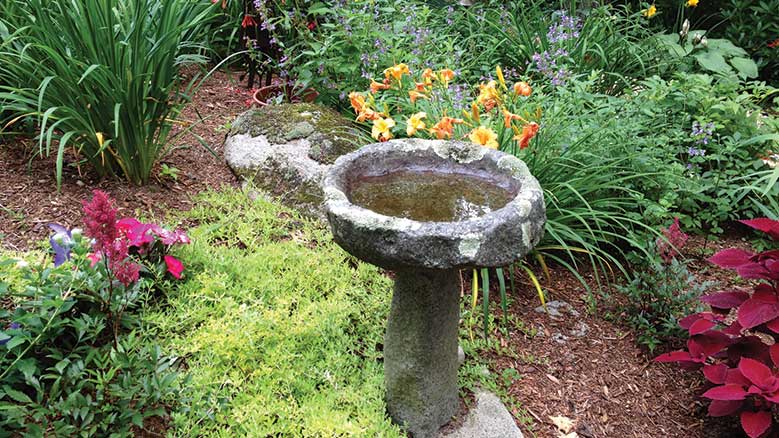
My mother had a green thumb. She could look at a plant and it would grow strong and bloom. All year long, Mother had flowering potted plants. Our house was on a corner of a suburban neighborhood, and in the summer people used to take the corner slowly in order to admire the colorful flowers.
I appreciate flower gardens, but I don’t have my mother’s chemistry with plants. My husband, Phil, however, does. He grew up in Manhattan, and, as an urban transplant, he takes great joy in his rural Massachusetts garden. We used to grow vegetables, but as time went by, we found that supporting the local farmers was more cost efficient. We switched to flowers, saying they were food for the soul. Phil enjoys working in the garden more than I do, but we both like to be outside. We enjoy many summer activities together, and attending New England Yearly Meeting’s annual sessions is a yearly event that nourishes us both.
I have had the opportunity to lead several workshops with Friends and other groups. As a storyteller, I especially like workshops that elicit stories of early memories about religion, prayer, and spirituality. When I’ve asked Quakers where they have felt close to God, I often hear Friends talk about a favorite place. As Friends, we know that we can have a relationship with God anywhere and anytime. We are less apt to identify a building as a holy place, or as “God’s house.” Often, when I’ve asked Friends to talk about where they feel closest to God, many name places in the natural world. They speak of the peace they feel by the seashore or in the mountains or the forest.
I am the same. I love the natural world. I’ve been fortunate, and I count my blessings. I can look out of the windows in my home in central Massachusetts and see the garden embraced by woods. Working in the garden takes my mind away from daily troubles, and I love seeing the results of my labor, but I feel more at peace when I look past the garden into the woods. God is the gardener for the woods.
The summers are becoming hotter. Sometimes there can be no rain for as long as two weeks. Last summer we had a drought, and by August the trees actually looked thirsty. There were several days when the air was still, the sun was hot, and predicted thunderstorms did not come.
A garden needs care even when it’s very hot. Phil and I wiped the sweat from our brows as we ripped out invasive forget-me-nots and talked about climate change. We wondered how the meager changes we’ve made in our household might help to save the earth for future generations.
Thinking about climate change can be depressing. When Friends tell me that in 30 years Manhattan will be flooded, or when I see photographs of polar bears on shrinking ice floes, it brings tears to my eyes. We write letters, make phone calls to legislators. We recycle, and take care to walk softly on the earth. More and more it seems that prayer and community are essential to the survival of life as we know it. Like many other Friends, we struggle not to be immobilized.
Working in the earth keeps Phil and me grounded. (The pun is intended.)
Last summer, as we were working in the garden, a slight breeze refreshed us. We took a break from our work, and I sat on the deck with a glass of iced tea. A hummingbird visited one of the flower boxes on the deck’s railing. I heard the familiar whirring sound of her wings. She perched, actually landed, on a red nicotiana five feet away from me, and she made a quiet joyful chirp! Then I heard her sip from the trumpet shaped flower. The slightly audible slurp sounded like a child with a straw, greedily enjoying the last drops of a milkshake.
Nature does not perform for us. The mysteries and miracles of life present themselves in unexpected ways. That summer afternoon, as I sat in silence, I heard two sounds that I had never heard before: the voice of a hummingbird and the lusty slurp as the tiny bird took nectar from the flower. I believe these small sounds reflect the joy and the miracle of the interdependence of life. This is God. Just by recalling the experience as I write, I feel refreshed and renewed. I was comforted that hot afternoon by the still, small voice that is available to us.
When I returned to the garden later that afternoon, I gave thanks for those plants that fellow gardeners had shared with us: columbine from Ginny, lily of the valley from Mike, lungwort from Renee, hydrangea from Pat, red daylilies from Tom and Riva, foam flowers from Suze, tall grass from Gerry, red dahlias from Barbara, and most recently, daisies from M.L. How can tending the garden feel like a tiresome chore when I am surrounded by f/Friends?
Every plant in a garden thrives because of the care of the gardeners. Friendships, like gardens, need care and maintenance. Let us make time to be fully present each moment—to attend to each other and to find joy in daily life.
My mother’s garden had a metal garden ornament that now has a place in ours. The once colorful paint on the picture has faded, and most of it has chipped away, but the words are still present:
The kiss of the sun for pardon,
The song of the birds for mirth,
One is nearer God’s heart in a garden
Than anywhere else on the earth.





Comments on Friendsjournal.org may be used in the Forum of the print magazine and may be edited for length and clarity.